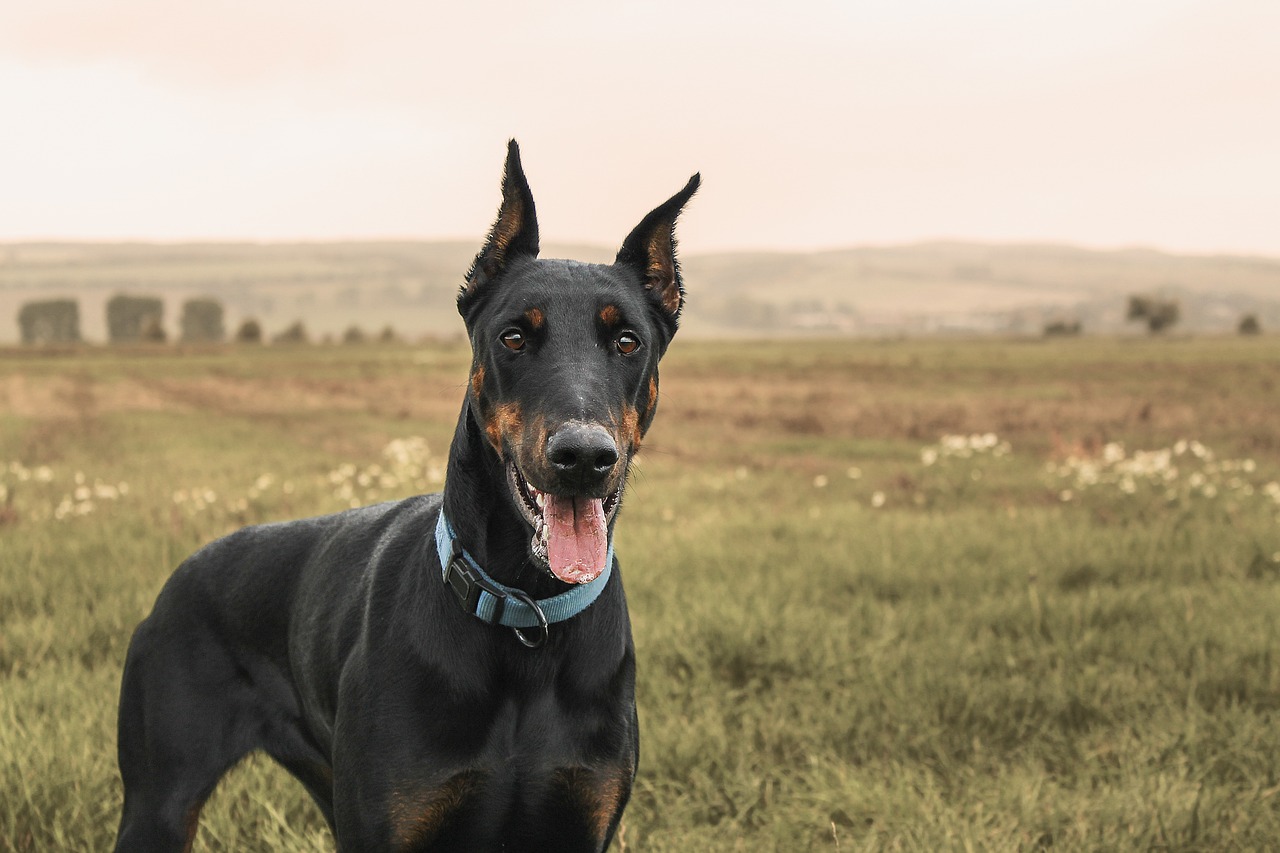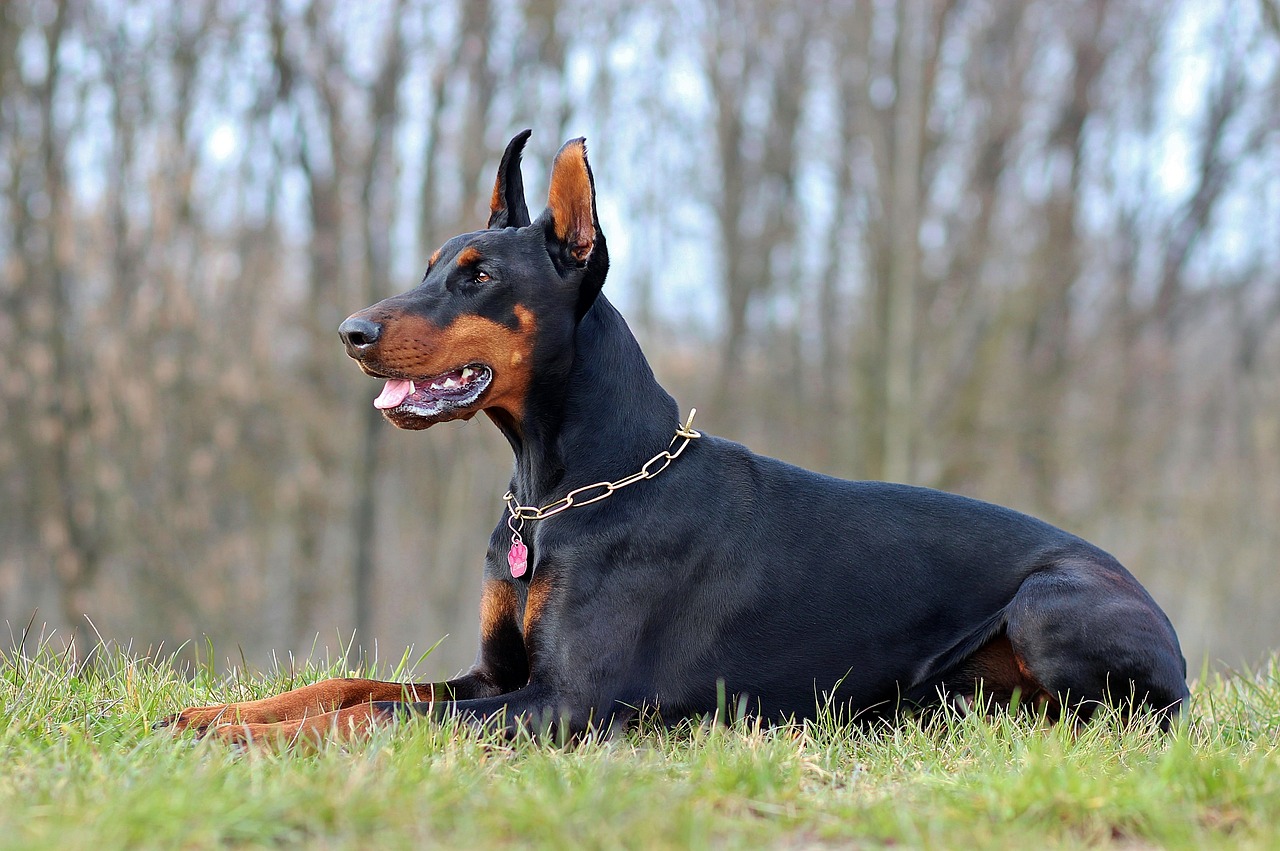The Doberman Pinscher, often known simply as Doberman, is renowned for its unique blend of strength, loyalty, and intelligence. Understanding the temperament of a Doberman is vital for potential owners to ensure a harmonious and lasting bond.
1. Intelligent and Trainable
Dobermans are highly intelligent, rank among the smartest dog breeds. This intelligence, paired with their eagerness to please their owners, makes them highly trainable. They can learn commands quickly, making them excellent working dogs and loyal companions.
2. Protective and Loyal
One of the standout traits of a Doberman is its protective nature. They are incredibly loyal to their owners and families, often going to great lengths to protect them from harm. This loyalty and protective instinct make them excellent guard dogs.
3. Energetic and Playful
Despite their serious and imposing appearance, Dobermans are energetic and playful dogs. They require regular exercise and mental stimulation to keep them happy and healthy. Their playful demeanor makes them great companions for families with older children.
4. Confident and Assertive
Dobermans carry themselves with confidence. They are assertive dogs that are aware of their surroundings, making them excellent watchdogs. However, their confidence requires responsible handling to ensure they are well-behaved and controlled.
5. Sensitive and Affectionate
Contrary to their tough exterior, Dobermans are sensitive dogs. They form deep bonds with their families and require regular affection and companionship. Leaving them isolated for long periods can lead to stress and anxiety.
The Doberman is a breed of contrasts—strong yet sensitive, protective yet affectionate. Understanding the intricacies of their temperament is crucial for fostering a loving and respectful relationship with these magnificent dogs.
How Does a Male Doberman Temperament Compare to a Female Doberman?
Male Doberman Traits:
1. Size and Strength
Male Dobermans are typically larger and more muscular than females, often displaying a more imposing presence. This physical stature may translate into higher energy levels and a need for more exercise and playtime.
2. Dominant and Confident
Males often exude confidence and dominance. While this trait makes them excellent protectors of their home and family, it also necessitates experienced handling and training to manage their assertive personalities effectively.
3. Consistent Affection
Male Dobermans are known for their consistent and overt affection towards their owners. They are often more attention-seeking, enjoying being in the spotlight and receiving love and praise from their families.
4. Territorial Behavior
Territorial instincts are usually more pronounced in males, making them superb guard dogs. Early socialization and training are imperative to prevent overprotectiveness and ensure they are approachable and friendly towards guests and other animals.
Female Doberman Traits:
1. Smaller but Agile
Females are generally smaller in size but exhibit agility and grace in their movements. Their slightly smaller stature doesn’t compromise their protective instincts or intelligence.
2. Independent and Reserved
Female Dobermans often showcase a more independent and reserved demeanor. They are affectionate and loyal but may not seek out attention as actively as males, displaying affection on their terms.
3. Protective of Family
While males are territorial, females are particularly protective of their immediate family members. This trait makes them excellent personal guardians, especially for children in the household.
4. Maturity and Focus
Females often mature faster than males, showing a serious and focused attitude during training sessions at a younger age. This maturity can facilitate smoother training processes, provided trainers use positive reinforcement techniques.
Frequently Asked Questions about a Doberman‘s Temperament and Personality

- How intelligent are Dobermans?
- Dobermans are highly intelligent and rank among the smartest dog breeds. They’re quick learners and can comprehend and follow commands efficiently, making them easier to train for various tasks and activities.
- Are Dobermans aggressive?
- Dobermans are not inherently aggressive. They are protective and can be assertive, but with proper training and socialization from an early age, they are known to be loyal, reliable, and well-mannered dogs.
- How are Dobermans with children?
- With appropriate training and socialization, Dobermans can be excellent with children. They are often protective and form strong bonds with the kids in their families, but supervision is always recommended during interactions.
- Do they get along with other pets?
- If socialized early and properly, Dobermans can coexist peacefully with other pets. Early exposure to different animals helps in developing their tolerance and acceptance.
- Are Dobermans easy to train?
- Thanks to their intelligence and eagerness to please, Dobermans are generally easy to train. However, they require a consistent and firm handler due to their confident and assertive nature.
- Do Dobermans make good guard dogs?
- Dobermans are excellent guard dogs due to their protective instincts and assertiveness. They are naturally alert and will not hesitate to defend their family and property if they sense a threat.
- Are they good apartment dogs?
- While Dobermans can adapt to apartment living, they require sufficient daily exercise to stay healthy and happy. A well-exercised Doberman is likely to be content even in smaller living spaces.
- How much exercise do Dobermans need?
- Dobermans are energetic dogs that require regular exercise. Daily walks, play sessions, and mental stimulation are crucial to keep them physically and mentally engaged.
- Are Dobermans affectionate with their owners?
- Absolutely. Dobermans are known for being extremely loyal and affectionate toward their owners. They thrive on human companionship and form deep bonds with their families.
- Do they have any stubborn tendencies?
- While intelligent, Dobermans can sometimes be stubborn. Consistency in training and establishing clear leadership is essential in managing their assertive personalities.
- How are Dobermans with strangers?
- Dobermans are often reserved or aloof with strangers but are not naturally aggressive. Proper socialization is important to prevent them from being overly suspicious or fearful of new people.
- Are Dobermans hypoallergenic?
- No, Dobermans are not hypoallergenic. They have short, fine fur that sheds minimally, but they still release allergens into the environment.
- Do Dobermans require a lot of grooming?
- Dobermans have low grooming needs due to their short coats. Regular bathing, nail trimming, and ear cleaning are the primary grooming tasks for this breed.
- Can Dobermans tolerate cold weather?
- Dobermans have thin coats and little body fat, making them sensitive to cold weather. In colder climates, they may require protective clothing and should not be left outside for extended periods.
- Are Dobermans suitable for first-time dog owners?
- While Dobermans are trainable and loyal, their assertive and confident demeanor might be challenging for first-time dog owners. They do best with owners who understand dog behavior and can establish themselves as the pack leader.
What Kind of Person Is a Good Fit for a Doberman?
 Before deciding to welcome a Doberman into your home, it’s crucial to evaluate if your personality and lifestyle align with the needs and temperament of this distinctive breed.
Before deciding to welcome a Doberman into your home, it’s crucial to evaluate if your personality and lifestyle align with the needs and temperament of this distinctive breed.
1. Experienced Dog Owner
Dobermans are best suited for individuals who have prior experience with dog ownership and training. Understanding canine behavior and training nuances is essential, as Dobermans are intelligent but can be stubborn and assertive.
2. Active Lifestyle
An active individual or family is ideal for a Doberman due to the breed’s high energy levels. They require regular exercise, mental stimulation, and engagement to maintain their physical and mental health.
3. Committed to Training
A prospective Doberman owner should be dedicated to providing consistent and firm training from an early age. Due to their intelligence and sometimes dominant demeanor, Dobermans respond well to structured training environments.
4. Understanding of Socialization Importance
Early and continuous socialization is pivotal for a well-adjusted Doberman. Owners should be willing to invest time in exposing their Dobermans to various environments, people, and animals to foster sociability and tolerance.
5. Home with Space
While adaptable, Dobermans thrive in environments where they have sufficient space to move and play. Homes with yards or access to open areas are ideal, but apartment living can be suitable if ample exercise is provided.
6. Prepared for Long-Term Commitment
Ownership requires a long-term commitment to the care, training, and health of the Doberman. Potential owners should be prepared for a dedication of time, effort, and resources to the life of the dog.
7. Seeking Protective Companion
If you are looking for a loyal and protective companion, a Doberman is a strong contender. They are known for their deep loyalty and protective instincts towards their owners and families.
The ideal owner for a Doberman is an experienced, active individual or family committed to providing consistent training, ample exercise, and lifelong care. Understanding and respecting the Doberman’s unique temperament while providing a structured and loving environment are key to fostering a harmonious and rewarding relationship with this noble and intelligent breed. Whether you are an experienced single dog owner, a couple, or a family with older children, if you lead an active lifestyle and seek a loyal, protective companion, a Doberman might be the perfect match for you.
 Toledo, United States.
Toledo, United States.
